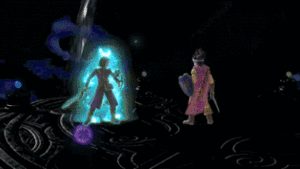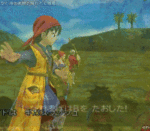Gigaslash: Difference between revisions
(Consistency with other special move pages and saving bytes; per proposal.) |
mNo edit summary |
||
| (5 intermediate revisions by 3 users not shown) | |||
| Line 1: | Line 1: | ||
{{articleIcons|ssbu=y}} | {{articleIcons|ssbu=y}} | ||
{{For|Cloud's similarly named Final Smash|Omnislash|}} | |||
{{Infobox Special Move | {{Infobox Special Move | ||
|name = Gigaslash | |name = Gigaslash | ||
|image = [[File:Hero Final Smash SSBU.gif|300px]] | |image = [[File:Hero Final Smash SSBU.gif|300px]] | ||
[[Hero]] using Gigaslash in ''Ultimate''. | |||
|user = {{SSBU|Hero}} | |user = {{SSBU|Hero}} | ||
|universe = {{uv|Dragon Quest}} | |universe = {{uv|Dragon Quest}} | ||
| Line 13: | Line 15: | ||
==Overview== | ==Overview== | ||
In this Final Smash, Hero performs an upward slash. Up to three opponents will be trapped in place as a cutscene plays where the remaining non-playable protagonists of the ''Dragon Quest'' series (in order of appearance — ''II'', ''V'', ''VI'', ''VII'', ''X'', ''IX'' and ''I'') appear and gather their weapons together, shooting energy upwards into the air, with the energy charging Hero's sword, who then attacks with an outward slash to launch the opponent. The game cannot be paused for the duration of the move. | In this Final Smash, Hero performs an upward slash. Up to three opponents hit by the slash will be trapped in place as a cutscene plays where the remaining non-playable protagonists of the ''Dragon Quest'' series (in order of appearance — ''II'', ''V'', ''VI'', ''VII'', ''X'', ''IX'' and ''I'') appear and gather their weapons together, shooting energy upwards into the air, with the energy charging Hero's sword, who then attacks with an outward slash to launch the opponent. The game cannot be paused for the duration of the move. | ||
The Final Smash is comprised of two hits, with the second hit only being activated if the first hit manages to hit a player. The first hit of the move is a ranged sword swing with an [[electric]] effect, dealing 7% damage to any opponents that have taken damage from the hit. The second hit activates after the cutscene finishes and deals 33% damage with immense knockback. On Final Destination, the attack can KO Mario at 15% at the ledge and 40% at the center (Percentages are from damage dealt with the [[Smash Ball]] variant of the Final Smash). According to the cutscene, the second hit is the result of a powerful electric slash from the sword that the Hero wields. Likewise, the second hit of Gigaslash will have an electric effect, similar to the first. | The Final Smash is comprised of two hits, with the second hit only being activated if the first hit manages to hit a player. The first hit of the move is a ranged sword swing with an [[electric]] effect, dealing 7% damage to any opponents that have taken damage from the hit. The second hit activates after the cutscene finishes and deals 33% damage with immense knockback. On Final Destination, the attack can KO Mario at 15% at the ledge and 40% at the center (Percentages are from damage dealt with the [[Smash Ball]] variant of the Final Smash). According to the cutscene, the second hit is the result of a powerful electric slash from the sword that the Hero wields. Likewise, the second hit of Gigaslash will have an electric effect, similar to the first. | ||
| Line 59: | Line 61: | ||
**Like these Final Smashes, Gigaslash's cutscene plays at 30 frames per second, as opposed to the rest of the game running at 60 frames per second. It's likely this was done as a space-saving measure. | **Like these Final Smashes, Gigaslash's cutscene plays at 30 frames per second, as opposed to the rest of the game running at 60 frames per second. It's likely this was done as a space-saving measure. | ||
**However, unlike those Final Smashes, Gigaslash does not show the person being attacked. | **However, unlike those Final Smashes, Gigaslash does not show the person being attacked. | ||
**Consequentially, two bugs can occur: | |||
***If the player returns to the Switch home screen during the cinematic, the animation of Hero swinging his electrified sword will be out of sync with the cutscene and cut to white early. | |||
***If the [[Bomber]] is used at the same time the Final Smash hits, the cutscene can be slowed down by the Bomber. | |||
*At around 7 seconds, Gigaslash was the longest cinematic Final Smash prior to the introduction of [[Sephiroth]], with his Final Smash (Supernova) now being the longest at around 8 seconds. | *At around 7 seconds, Gigaslash was the longest cinematic Final Smash prior to the introduction of [[Sephiroth]], with his Final Smash (Supernova) now being the longest at around 8 seconds. | ||
*The appearance of the Hero from ''Dragon Quest X'' in this Final Smash marks the second time the character has appeared outside of Japan, with the first being ''Dragon Quest XI''. This is due to ''Dragon Quest X'' currently being the only main series game to have never been released outside of Japan. | *The appearance of the Hero from ''Dragon Quest X'' in this Final Smash marks the second time the character has appeared outside of Japan, with the first being ''Dragon Quest XI''. This is due to ''Dragon Quest X'' currently being the only main series game to have never been released outside of Japan. | ||
*''Ultimate''{{'}}s depiction of Gigaslash was later referenced in the arcade game ''{{s|wikipedia|Dragon Quest: Scan Battlers}}''.<ref>https://twitter.com/DQSB_PR/status/1198511571162390528</ref> The name translates to Ultimate Gigaslash. | *''Ultimate''{{'}}s depiction of Gigaslash was later referenced in the arcade game ''{{s|wikipedia|Dragon Quest: Scan Battlers}}''.<ref>https://twitter.com/DQSB_PR/status/1198511571162390528</ref> The name translates to Ultimate Gigaslash. | ||
== References == | == References == | ||
Latest revision as of 00:23, September 13, 2024
| Gigaslash | |
|---|---|

Hero using Gigaslash in Ultimate. | |
| User | Hero |
| Universe | Dragon Quest |
Gigaslash (ギガスラッシュ, Gigaslash) is Hero's Final Smash.
Overview[edit]
In this Final Smash, Hero performs an upward slash. Up to three opponents hit by the slash will be trapped in place as a cutscene plays where the remaining non-playable protagonists of the Dragon Quest series (in order of appearance — II, V, VI, VII, X, IX and I) appear and gather their weapons together, shooting energy upwards into the air, with the energy charging Hero's sword, who then attacks with an outward slash to launch the opponent. The game cannot be paused for the duration of the move.
The Final Smash is comprised of two hits, with the second hit only being activated if the first hit manages to hit a player. The first hit of the move is a ranged sword swing with an electric effect, dealing 7% damage to any opponents that have taken damage from the hit. The second hit activates after the cutscene finishes and deals 33% damage with immense knockback. On Final Destination, the attack can KO Mario at 15% at the ledge and 40% at the center (Percentages are from damage dealt with the Smash Ball variant of the Final Smash). According to the cutscene, the second hit is the result of a powerful electric slash from the sword that the Hero wields. Likewise, the second hit of Gigaslash will have an electric effect, similar to the first.
Instructional quote[edit]
| The hero swings his sword forward. If it hits an opponent, the hero calls upon the power of past protagonists. This attack can hit up to three fighters and will launch them all at the end of the move. |
Origin[edit]

Gigaslash is a powerful, recurring ability in the Dragon Quest series - first introduced in the manga Dragon Quest: The Adventure of Dai (as "Gigabreak" and its variant "Giga Strash") before entering the main series in Dragon Quest VI. Despite its name suggesting a physical attack, the move is a magical attack; it deals immense Zap damage on a single group of enemies. The heroes channeling lightning also resembles Kazapple, a magic spell that draws MP from the entire party to activate.
Eight, the Hero from Dragon Quest VIII, can learn Gigaslash as a sword-only technique after fully investing 100 skill points into either the "Sword" or "Courage" skills, while the Luminary, the Hero from Dragon Quest XI, will learn Gigaslash for 25 points in his Swordmastery skill tree. However, both Solo, the male Hero from Dragon Quest IV, and Erdrick, the male Hero from Dragon Quest III, can not learn Gigaslash due to its late introduction into the series, even in their ports and remakes on other hardware after the release of Dragon Quest VI but the former however, can learn Gigasword in the Dragon Quest IV remake on DS which is similar to Gigaslash.
Gallery[edit]
Gigaslash as shown by the Move List in Ultimate.
Names in other languages[edit]
Trivia[edit]
- The Hero from Dragon Quest V is the only Hero that is not depicted wielding a sword. He instead wields a staff.
- Gigaslash is one of four Final Smashes to incorporate a pre-rendered cinematic, along with All-Out Attack, House of Boom, and Supernova.
- The art assets used for said cinematic appear to be recycled from Dragon Quest: Monster Battle Road Victory.
- Like these Final Smashes, Gigaslash's cutscene plays at 30 frames per second, as opposed to the rest of the game running at 60 frames per second. It's likely this was done as a space-saving measure.
- However, unlike those Final Smashes, Gigaslash does not show the person being attacked.
- Consequentially, two bugs can occur:
- If the player returns to the Switch home screen during the cinematic, the animation of Hero swinging his electrified sword will be out of sync with the cutscene and cut to white early.
- If the Bomber is used at the same time the Final Smash hits, the cutscene can be slowed down by the Bomber.
- At around 7 seconds, Gigaslash was the longest cinematic Final Smash prior to the introduction of Sephiroth, with his Final Smash (Supernova) now being the longest at around 8 seconds.
- The appearance of the Hero from Dragon Quest X in this Final Smash marks the second time the character has appeared outside of Japan, with the first being Dragon Quest XI. This is due to Dragon Quest X currently being the only main series game to have never been released outside of Japan.
- Ultimate's depiction of Gigaslash was later referenced in the arcade game Dragon Quest: Scan Battlers.[1] The name translates to Ultimate Gigaslash.


